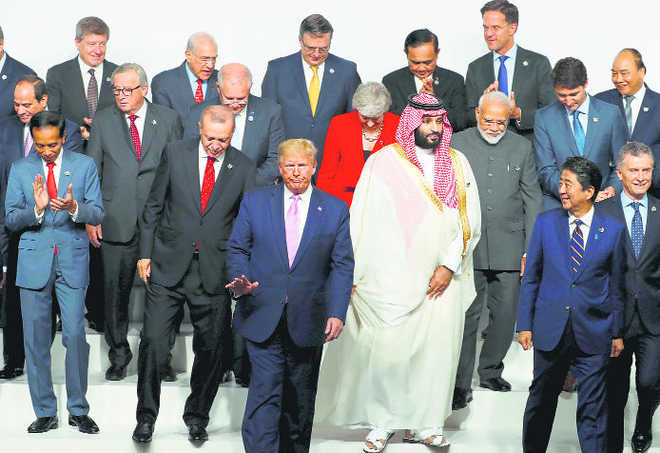
Together they stand? The tone of the Osaka declaration was at odds with deep tensions among the world’s key leaders.
Shyam Saran
Former foreign secretary and senior fellow, centre for policy research
THe 14th G20 Summit concluded in Osaka on June 28 with an obligatory declaration that was replete with high-sounding phrases but anaemic in substance. The very first G20 Summit was born in the aftermath of the global financial and economic crisis and there was an unprecedented level of cooperation among the major economies to deploy coordinated policy action to rescue the global economy. India became part of that effort and thereby acknowledged as a major economic and political actor on the global arena. The success of that effort led to the institutionalisation of the summit process as the premier international forum for international economic coordination. As the crisis has faded and domestic concerns have surfaced in virtually each of the member countries, the summit has become a platform for competing national agendas and, at best, maintaining a pretense of collaboration.
The tone of the Osaka declaration was at odds with deep cracks and tensions among the world key leaders with President Trump at his disruptive best. True to form, he successfully deflected attention from the serious issues by his tweet about meeting North Korean leader Kim Jong-un at the Demilitarised Zone (DMZ) separating the North from the South. The meagre pickings from the summit included a belated commitment to increase the resources with the IMF, a reiteration of the Paris Climate Agreement (with the US dissenting), the strengthening of the FATF to curb money-laundering and terror-financing and a pledge to prevent the collapse of the WTO’s critical role in trade dispute settlement by the prospect of the US withdrawing its refusal to permit appointment of personnel to vacant positions on its tribunals. There were the expected references to the importance of global governance of the digital economy, the regulation of data flows and new technologies such as artificial intelligence, but no hint of what the G20 proposed to do in terms of coordinated international policy-making and practical action. On display was a depressing decline of internationalism and multilateral action, precisely at a time when they are needed the most in tackling the key issues. It is not, as a European leader recently observed with candour, that we do not know what we need to do, but rather how we get elected after having done so.
The attention then naturally shifted to how the relationships among key actors played out at the summit. The US-China trade war was the central preoccupation and the Trump-Xi meeting delivered a ceasefire and the resumption of talks. Trump held off on the imposition of new tariffs on a further $300 billion of Chinese exports, for the time being, and approved the resumption of sale of US components to Chinese telecom giant Huawei, which has been in his cross-hairs. This is unlikely to resolve the structural nature of the economic conflict between the two largest economies and will certainly do nothing to ameliorate the sharpening geopolitical confrontation between them. Such remissions will come and go but the underlying dynamics will not alter.
Putin touched a raw nerve among Western countries by declaring that liberalism and the liberal order was now ‘obsolete’. However, he was merely stating the obvious. The spectacle of Trump hosting a breakfast meeting for Saudi Arabia’s Crown Prince Salman, whose culpability in the murder of journalist Khashoggi last year is well known, is hardly a ringing endorsement of liberal values. Putin has reason to be smug and dismissive of the hostility which he has had to contend with these past few years from the West.
This was PM Modi’s first major international engagement after his resounding electoral success. His bilateral meeting with Trump was subdued, overshadowed as it was by Secretary of State Pompeo’s earlier visit to New Delhi which threw up several divergent issues. These include the perennial trade disputes which are beginning to have a corrosive impact on the overall relationship. India’s ties with Iran and its decision to go ahead with the purchase of the Russian S-400 air defence system may introduce new strains and could well strengthen growing perceptions in Washington that the value of the Indo-US strategic partnership has been overplayed. India’s current approach of ‘multi-alignment’ as means of maintaining its strategic autonomy was clearly visible in Modi’s participation in two back-to-back trilaterals — one with Trump and Shinzo Abe and the other with Xi and Putin. This is a repeat of similar meetings at the previous summit. For good measure, there was also a BRICS Summit bringing together the leaders of Brazil, Russia, India, China and South Africa. At the India-US-Japan trilateral, the focus was on security in the Indo-Pacific while in the India-Russia-China trilateral, there was clearly a convergence of interest on maintaining an open and multilateral global trade regime, opposing protectionism and unilateralism and supporting more sovereign control over the digital economy. What India is looking for are issue-based coalitions and interest-based partnerships, but this will become more complicated as geopolitics becomes increasingly polarised. There are key thresholds to watch out for. Will India be ready to upgrade the Quad — a security consultative forum among India, the US, Japan and Australia — to a ministerial, or even summit level? Would it be ready to multilateralise the separate bilateral security arrangements it has with each of its partners in the Quad? To begin with, would it be ready to invite Australia to join in the Malabar multilateral naval exercises it has with the US and Japan? Will it be possible to insulate such security arrangements from the difficult and longstanding economic and trade issues which continue to beset Indo-US ties? These will be the difficult choices Modi will need to ponder as he seeks to position India in a fluid international landscape.



























